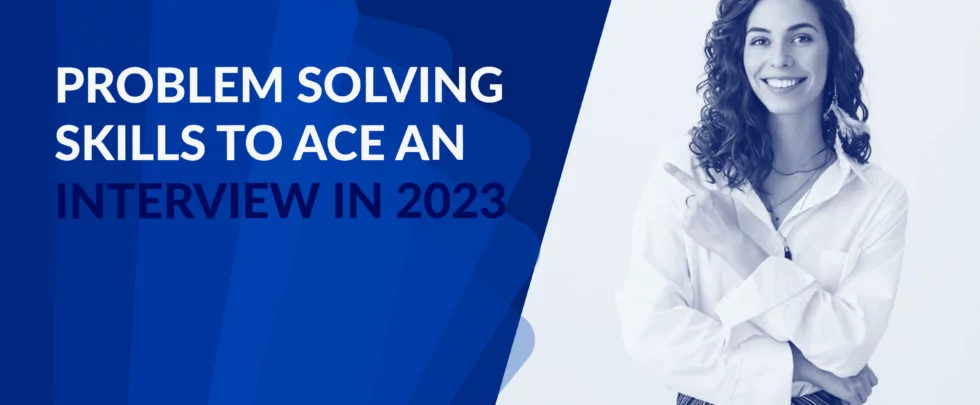If you want to ace that upcoming job interview, you need to show that you know how to solve problems. That’s why finely honed problem solving skills are so important in today’s highly competitive job market.
Employers want employees who can think quickly and accurately. Showing off your skills in this matter will help demonstrate your worth as a valuable asset to the company.
In this article, we will give you tips on how to hone your problem-solving skills, both soft skills, technical skills, as well as analytical skills, so you can ace any job interview.
Whether it’s a coding test or a role-playing exercise, showing off your intelligence is an integral part of getting the job!
Discover What Problem Solving Skills Are
Problem solving skills refer to one’s ability to solve problems logically and effectively. When it comes to interviews, this type of skill can help you stand out as a competent candidate.
This is not something mentioned in your job description, but rather something you go through during the interview with your hiring manager!
To be successful at this, there is a problem-solving process you have to follow, but fear not as it is not that complicated!
You’ll need strong observation powers and analytical capabilities. This means being able to identify key obstacles and solutions quickly and accurately while being mindful of the overall objectives.
During the this process, you’ll also want to be adaptive when it comes to your approach and flexible with different strategies. Knowing how to collect data, interpret information, and develop solutions will all help you impress the interviewer with your top notch problem-solving abilities!
So, this means that understanding how your decisions affect both short-term and long-term goals is essential for success when using problem-solving skills during an interview. It requires a lot of effort and commitment but if done correctly can really make you shine in any job application or scenario!
Now that you got a hang of what they are, as a definition, we will now move into getting to know what they actually are!
Active Listening
Active listening is arguably the most important skill in any type of problem-solving situation, including an interview. It’s a way of engaging with another person without judgment or assumption and really understanding them and what they are saying.
It requires you to be present, attentive, and listen carefully beyond words. Active listeners focus on both verbal and nonverbal cues, such as body language and tone, to gain deeper insight into what the other person is saying.
Another thing about active listening is that it also involves asking insightful questions that help clarify the speaker’s meaning and uncover new perspectives. Doing this will make it easier for you to identify potential problems before it even arises!
By practicing active listening, you can show potential employers that you have excellent problem-solving skills and can efficiently get conversations going in order to discover solutions to any problem.
Decision Making
When an interviewer asks you about decision making, they are gauging your problem-solving abilities. Show them you have the skills by providing examples of decisions that you’ve made in the past.
Decision making requires gathering data, analyzing it, and drawing a conclusion quickly and accurately. Explain how you collect data from multiple sources, interpret it and make sound decisions for the benefit of yourself and your organization.
Detail how good decision making has improved operations with lessons learned from failures. Provide examples of previous difficult situations where you had to make a quick decision and explain how it resulted in positive outcomes for your team or company!
Demonstrate that even when faced with hard choices, you can weigh out each option carefully before deciding on the best action based on the situation at hand. Show that your decisions have saved time, money, and resources while achieving objectives efficiently!
Generating Interventions
Generating interventions is a great way to show your problem-solving skills in an interview. It involves taking the time to come up with potential solutions that can help resolve the issue at hand.
Start by looking at all angles of the problem and coming up with creative solutions that you believe will deliver effective results.
Brainstorm as much as possible and look for ideas that other people might not think of or would never have considered. Think outside the box and be creative when it comes to generating interventions for the interviewer.
Make sure you document everything and explain why certain solutions were chosen over others. This will demonstrate critical thinking, attention to detail, and strong analytical skills which are skills employers are always searching for!
Evaluating the Solutions at Hand
When it comes to problem-solving skills, you’ll need to be able to evaluate the solutions you come up with, as they have to be effective solutions.
The first thing you have to keep in your mind at all times is that you should consider taking a broad perspective and looking at different stakeholders that would be affected by your solution.
The second thing is, you should always look at and consider the short-term effects of your solutions and assess which one would give the best outcomes in the shortest amount of time.
Last but not least, evaluate the long-term consequences as well as any risks associated with your solutions. Think about how feasible it is for them to be implemented and how likely is it that they could fail.
And finally, weigh up the pros and cons of each solution so you can pick one that will be the most beneficial in both the short and long term. This exercise will show potential employers your ability to think critically and make balanced decisions!
Assessing Those Solutions’ Effectiveness
Once you got some creative thinking going on and considered how to solve the problem, your next task is to assess those solutions’ effectiveness. You’ll want to consider each solution carefully and ask yourself if it will actually work.
As you know, it’s important to not only identify possible solutions but to also be able to evaluate their impact on the overall situation. That way you can determine which one is most likely to be successful and move forward with that one.
So, when assessing a potential solution, make sure you look at all the details and think about the long-term implications of whatever solution you choose. Try to consider various factors including budget, profitability, time frame, customer satisfaction, etc., and decide which one is most suitable for your needs.
Ultimately, being able to accurately analyze and assess solutions is an invaluable quality for any interviewee! It shows your future employer that you’re capable of making sound decisions even in difficult situations.
Implementing a Plan
Once you have brainstormed potential solutions and identified the most promising one, it’s time to implement a plan. Having a clear plan of action is essential to achieving success.
Think about how each step works together and how long it will take to complete from start to finish. Implementing your plan shouldn’t be rushed, so consider scheduling milestones and tracking progress along the way.
When implementing your plan, utilize both the resources available and any support networks you can find. This could include seeking advice from mentors, conducting research, or referring to online resources for additional help or guidance.
Also, remember that proper communication with other stakeholders involved is key. Regular updates will help build trust between parties and also permit an iterative approach if changes are necessary during the project lifecycle.
Flexibility
Flexibility is so important when it comes to problem-solving skills for any job interview. Employers want to know that you can think on your feet, switch gears quickly and adapt to changing environments.
If the interviewer throws a curveball with an unexpected question, they want to see if you can quickly adjust and respond confidently. You need to prove that you are flexible and have the ability to tackle new challenges.
Many times during interviews, employers will throw out hypothetical problems they would like to see how you handle them. It’s in these moments where your flexibility pays off!
Demonstrate that you’re not only able to come up with an answer but also tweak it as needed or explore multiple solutions depending on the parameters of the hypothetical problem. Show off this skill and make a great impression during your job interview!
Possessing Analytical Skills
Analytical skills are incredibly important when it comes to problem-solving. If you possess analytical skills, you can methodically analyze every angle of a problem and draw logical conclusions based on the evidence.
Businesses usually love candidates who demonstrate strong analytical skills because it shows that they’re not afraid to tackle complex problems head-on. Not only will this impress an interviewer, but it can also be an essential skill for succeeding in many jobs.
When you’re interviewing, make sure to mention any significant analytical tasks or challenges you’ve tackled in the past. They don’t have to be related to the position you’re applying for!
For example, if you solved a complicated math problem at school or used your analysis skills while working on a hobby project, make sure to talk about it during the interview. That’s how employers will identify your analytical and problem-solving abilities!
Having Organizational Skills
This one, a-k-a organizational skills are another major key skill to solving problems quickly and effectively. Employers recognize that having these skills can contribute to the success of any business.
Having organizational skills allow you to approach tasks with an organized mindset and prioritize tasks efficiently, so you get important things accomplished.
You’ll need this skill when making decisions, working in teams or leading group projects, organizing meetings, or deciding which tasks have priority and should be completed first.
It also means being efficient with time management, handling multiple requests at once, multitasking or troubleshooting computer or IT issues. Being well-organized is a surefire way to prove your problem-solving abilities!
Interpersonal Skills
Having strong interpersonal skills means being able to listen attentively, communicate clearly and respond appropriately in conversations. It also means having the capacity to interact effectively with others, build relationships and show empathy.
Not only should you demonstrate these interpersonal skills during an interview, but potential employers will be looking for evidence of your interpersonal skills based on your previous work experience.
This means you need to know how to handle difficult conversations, ask questions before making decisions, and collaborate with colleagues from diverse backgrounds if you want your employer to take notice of your problem-solving capabilities.
Being Emotionally Intelligent
Although this might not sound like your typical problem-solving skill, but it does tremendously help during your interview!
Having emotional intelligence means that you can pause before responding in difficult situations so that emotions don’t take over. This will enable you to stay open-minded and come up with alternate solutions to complex problems.
You can demonstrate emotional intelligence during an interview by using neutral language when describing past work experiences and interactions with colleagues. Instead of getting angry or defensive about a sticky situation, talk about how you attempted to reach understanding and resolution for everyone involved.
Showing that you are emotionally intelligent in an interview will demonstrate your ability to stay calm under pressure, understand multiple perspectives and effectively assess a situation from all angles.
Having Research Skills
Research skills are essential when applying for a job; they help you understand the challenges in your chosen field. Knowing the challenges of a position will make you more prepared to ace any job interview.
You can present your research skills by researching potential employers and the positions you are applying for. A great way to do this is by reading industry news, websites, or blogs that have relevant information about the company and its products or services.
This information can be used during an interview to answer questions and give a deeper understanding of the company. It also shows your interviewer that you are keen to learn more about their business and that you take initiative when it comes to staying current with industry trends.
Having strong research skills will impress future employers and may even help you land the job!
Having Great Communication Skills
Having great communication skills is an important problem-solving skill to have during an interview. Being able to communicate clearly and effectively makes understanding the problem, crafting solutions, and coming to a consensus much easier.
When you have excellent communication skills, you can easily connect complex ideas with simple language and explain things in a way that your interviewer will understand. This helps make sure everyone is on the same page with regard to solving the problem at hand.
It’s also helpful because it allows both parties to brainstorm together – instead of talking at each other – which can result in even better solutions before making a final decision.
Having great communication skills also shows your positive attitude and ability to get along with others when placed in a professional situation!
Also Read; 15 Tips For Motivation Before an Interview
Final Thoughts
Overall, having the right problem-solving skills can be a major asset for you to add when it comes to job interviews.
Use this information to make sure you know how to tackle any questions you get during an interview and put your best foot forward. You never know what kind of opportunities you might find as a result!
Ok, that’s it for today, if you want to ace your next job interview, don’t hesitate to check out Interviewjoy’s job interview preparation guides created by recent candidates and employees.
See you in the next article!


